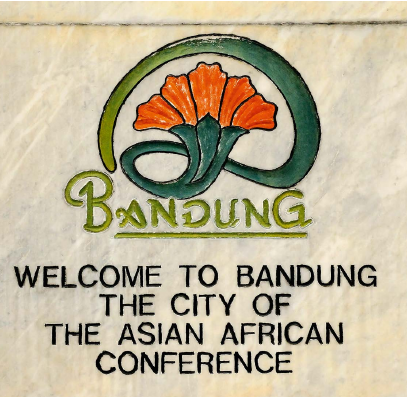Rule of Law in a Multipolar World
On 18 April 1955, Indonesia’s president opened what was then called „the first intercontinental conference of coloured peoples in the history of mankind“ in Bandung, Indonesia. 70 years later Bosch- and Koerber-Foundation look on Multilaterlalismn in A New Era of Multi-Alignment (https://koerber-stiftung.de/site/assets/files/49303/koerber-stiftung_70-years-since-bandung.pdf)
My contribution:
The Bandung Conference was a demonstration of the self-confidence of the states of Africa and Asia vis-à-vis old and new colonial powers. There is no straight path from it to formats such as BRICS or the Shanghai Cooperation Organization, but the roots of Global South cooperation were laid then.
This cooperation is changing the world. The BRICS countries make up 48 per cent of the world’s population, have 39 per cent of its economic output, and produce 54 per cent of greenhouse-gas emissions. The 10 per cent of the world’s population in the G7 countries account for less than a third of economic output. And we witness not only that the economic balance has shifted in favour of the Global South but also the collapse of the old world order.
Many believed that the end of the Cold War made the triumph of democratic capitalism unstoppable. Yet the unilateral era at the ‘end of history’ – with the United States as global power broker – came to an end in Afghanistan, Iraq and Libya. The end of real socialism also heralded the end of the post-1945 order based on the dominance of the US dollar, US military strength and international institutions such as the United Nations, the Bretton Woods bodies and NATO.
This system was dominated by states that defined themselves as the West – not a positive term, and certainly not an innocent one. The West’s dominance was based on force. Europeans may forget this, but not the Global South.1
Today, the West has reached an end. The United States’ overextension as a global power has long been apparent. Donald Trump has drawn conclusions from this. If Washington cannot be the dominant global power, it no longer wants to maintain order. Instead, Trump is focusing on disruption. That is why he is sealing off the US market with a tariff war. He tries to assert US interests by blackmailing weak countries and seeking deals with strong ones.
The result threatens to be an international order in which empires violently enforce their spheres of influence and the law of the strongest prevails over the rule of law. It would be an order more like that before the First World War than that after the Second World War.
This new order cannot be reduced to the contrast between autocracies and democracies. In Europe, the conflict between the democratic European Union and imperialist-revisionist Russia is intensifying. However, it has become more than doubtful that the United States will continue to side with the EU. There is a global systemic rivalry between the states of democratic capitalism and the authoritarian state capitalism of China. Meanwhile, the democratic capitalism of the United States is turning into authoritarian oligarchism, making it a new systemic rival for a democratic Europe.
The new order is exacerbating problems. Worldwide, funds for combating poverty and hunger are being cut. Military spending is rising. The nuclear arms race is expanding. Various wars – from Congo to Sudan to Gaza and Ukraine – risk becoming endless. The ability to respond to global crises is declining, from the accelerating climate crisis to the plastic crisis. Global governance through the United Nations is massively weakened.
The new order is not to the advantage of Europe or the countries of the Global South. Both benefited from the rule of law and, despite its downsides, from globalization. The rise of 800 million Chinese out of poverty is testimony to this, as is the development of India and Vietnam.
Europe faces a fundamental decision: to become a pole in a multipolar world or to subordinate itself to one of the poles? As its poor deal with Washington in the tariffs war shows, the EU still wavers between sovereignty and appeasing its old ally turning blackmailer.
But even a sovereign Europe needs partners. And alliances with democratic capitalist countries such as Australia, Canada Japan, New Zealand and South Korea are not sufficient. It also needs reliable political and economic relations with the democratic BRICS countries in particular, such as Brazil, India and South Africa.
Europe’s approach in a multipolar world must be based on interests. China is a systemic rival for the EU, and poses a military challenge, at least for its neighbours. Economically, however, Europe is closer to China and India today than to Russia and the United States. Like it, China and India have an interest in regulated access to markets. Much of Russian and US political power is based on their position in the fossil-fuel markets. China, Europe and India have a massive interest in freeing themselves from this dependence by accelerating investment in renewables and climate protection.
So there are good reasons for Europe to cooperate even with difficult systemic rivals such as China, because this reduces its vulnerability to blackmail by the new systemic rival across the Atlantic.
Bandung took place in a world of unjust multilateralism. It is not in the interests of Europe or the Global South today to replace this with the law of the strongest. In a multipolar world, complex, interest-driven pluralistic alliances are needed to resolve conflicts of interest in a rule-based manner. Europe must face up to this to fulfil all societies’ claim to prosperity and to overcome global challenges such as the climate crisis.
1 For why talking about „the West“ is not productive, see the chapter „Abschied vom Westen – Die Idee Europa“ in: Jürgen Trittin, Alles muss anders bleiben , Munich 2024, p. 359 ff.
